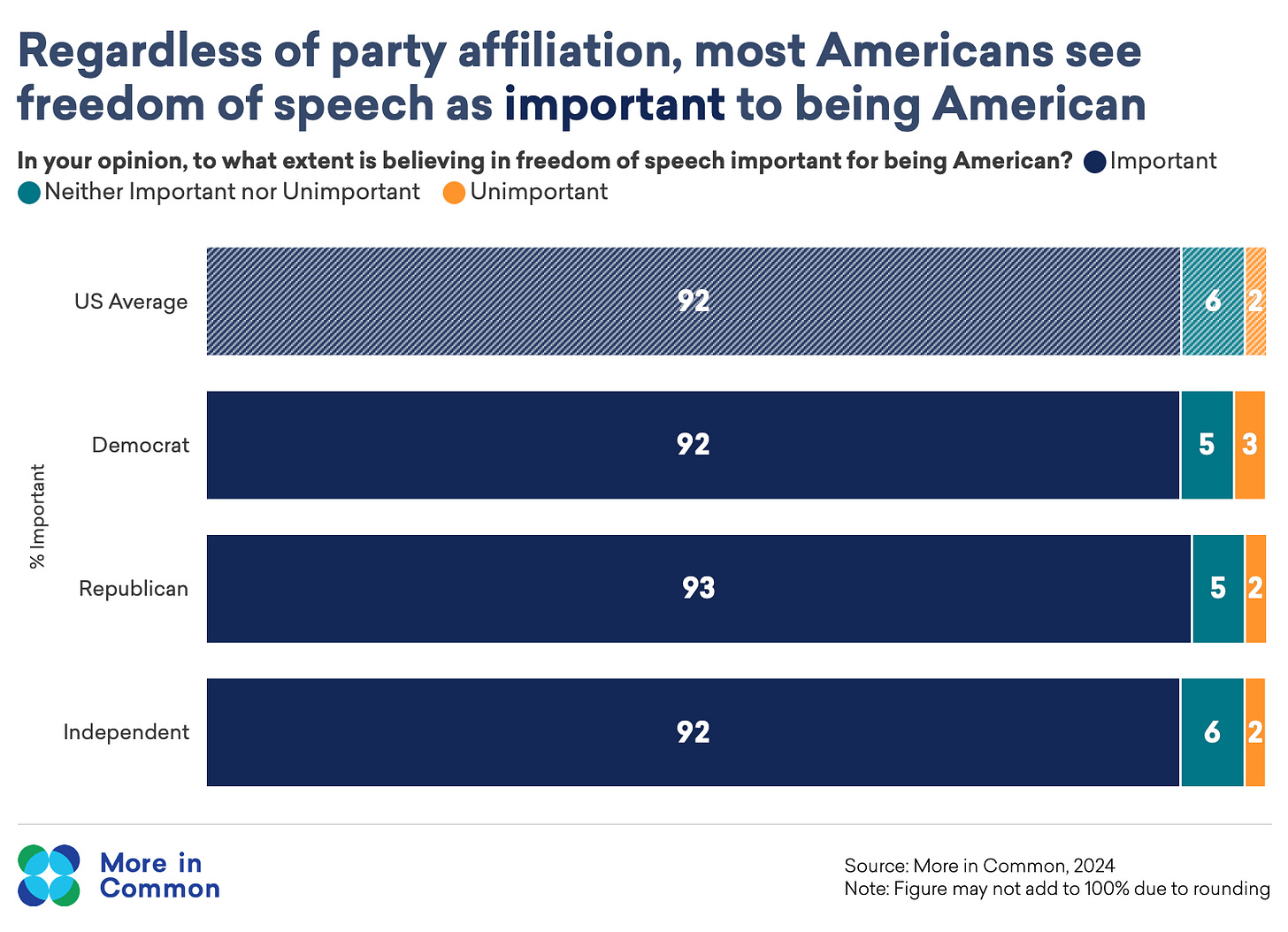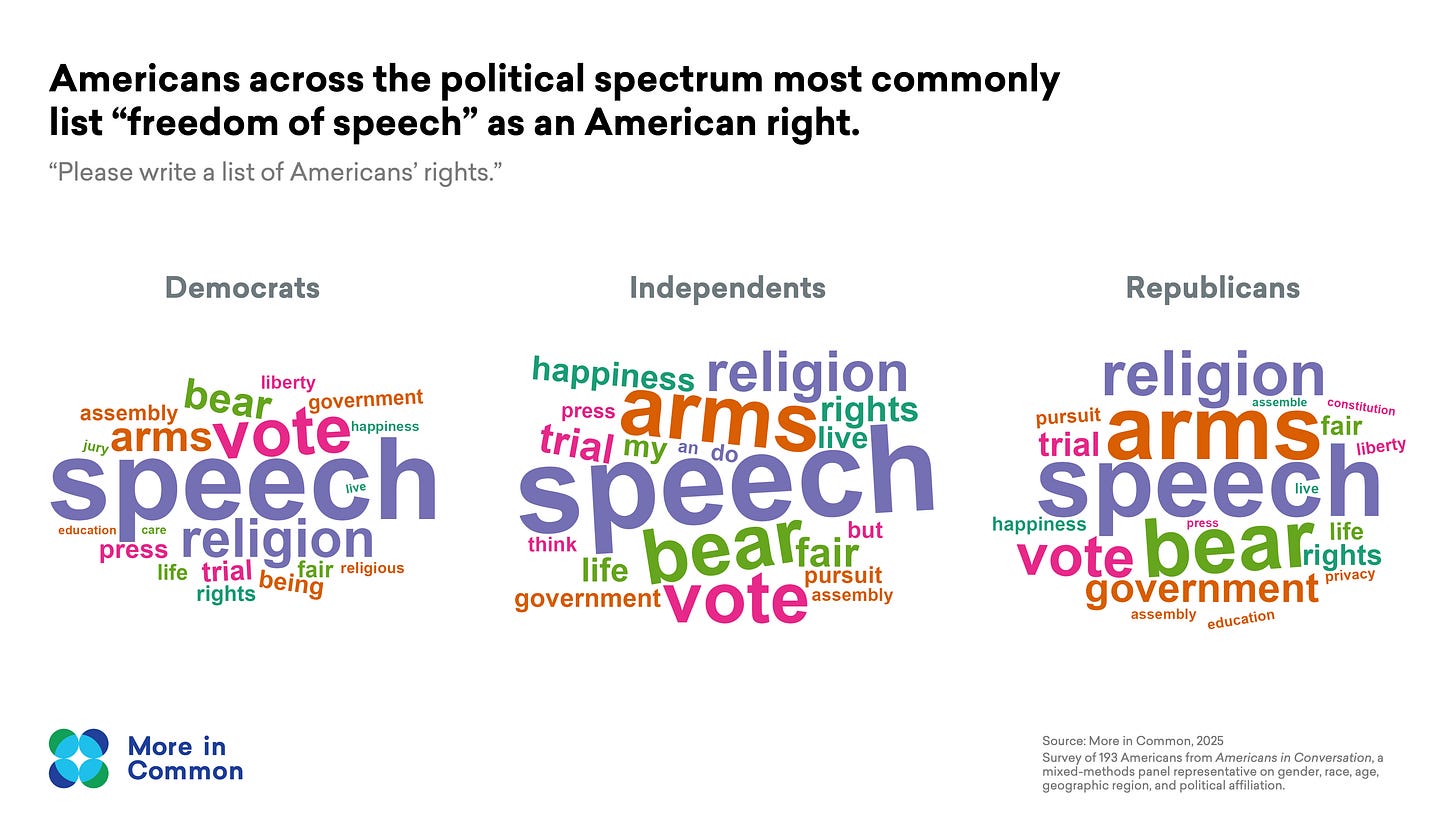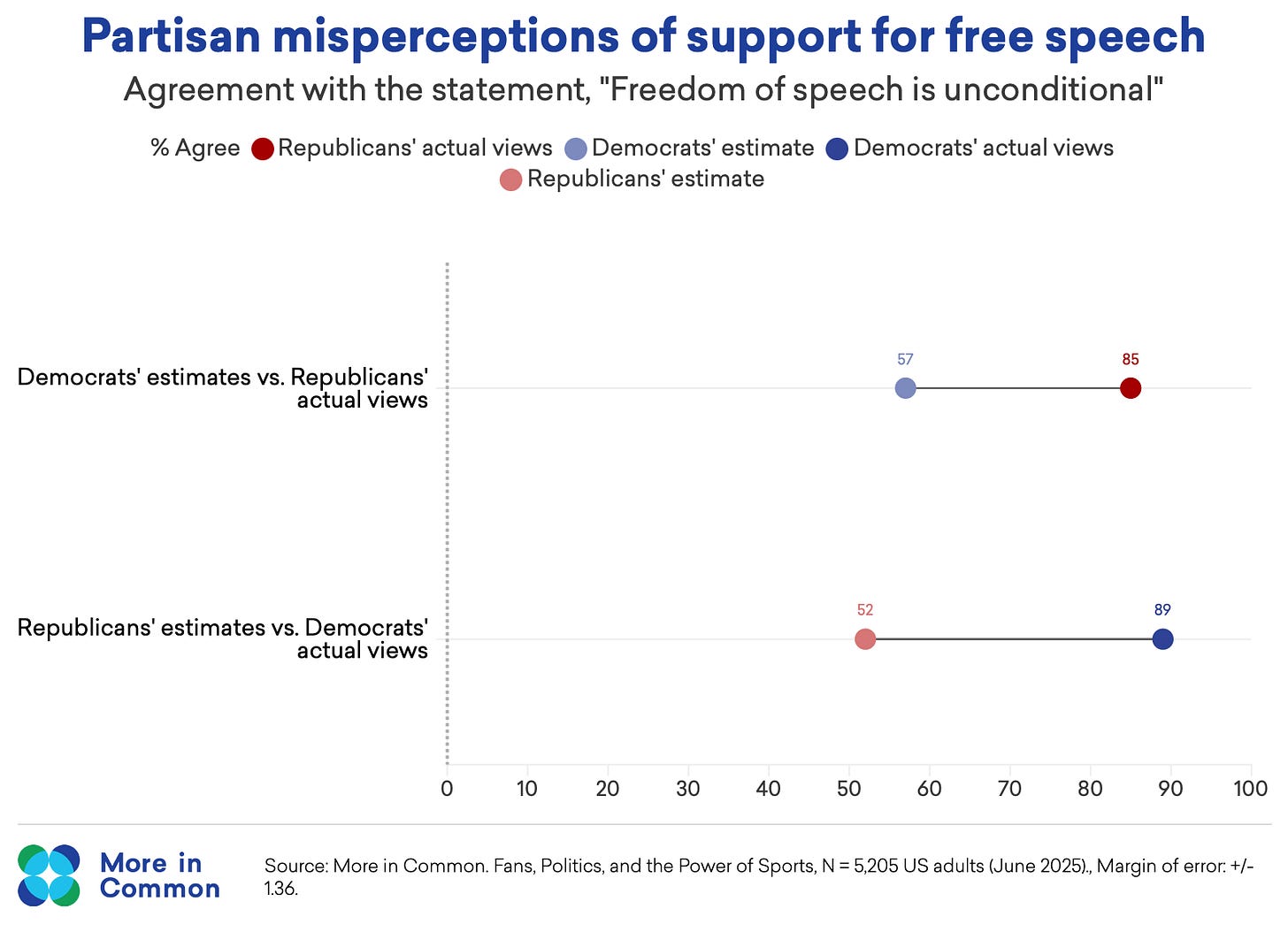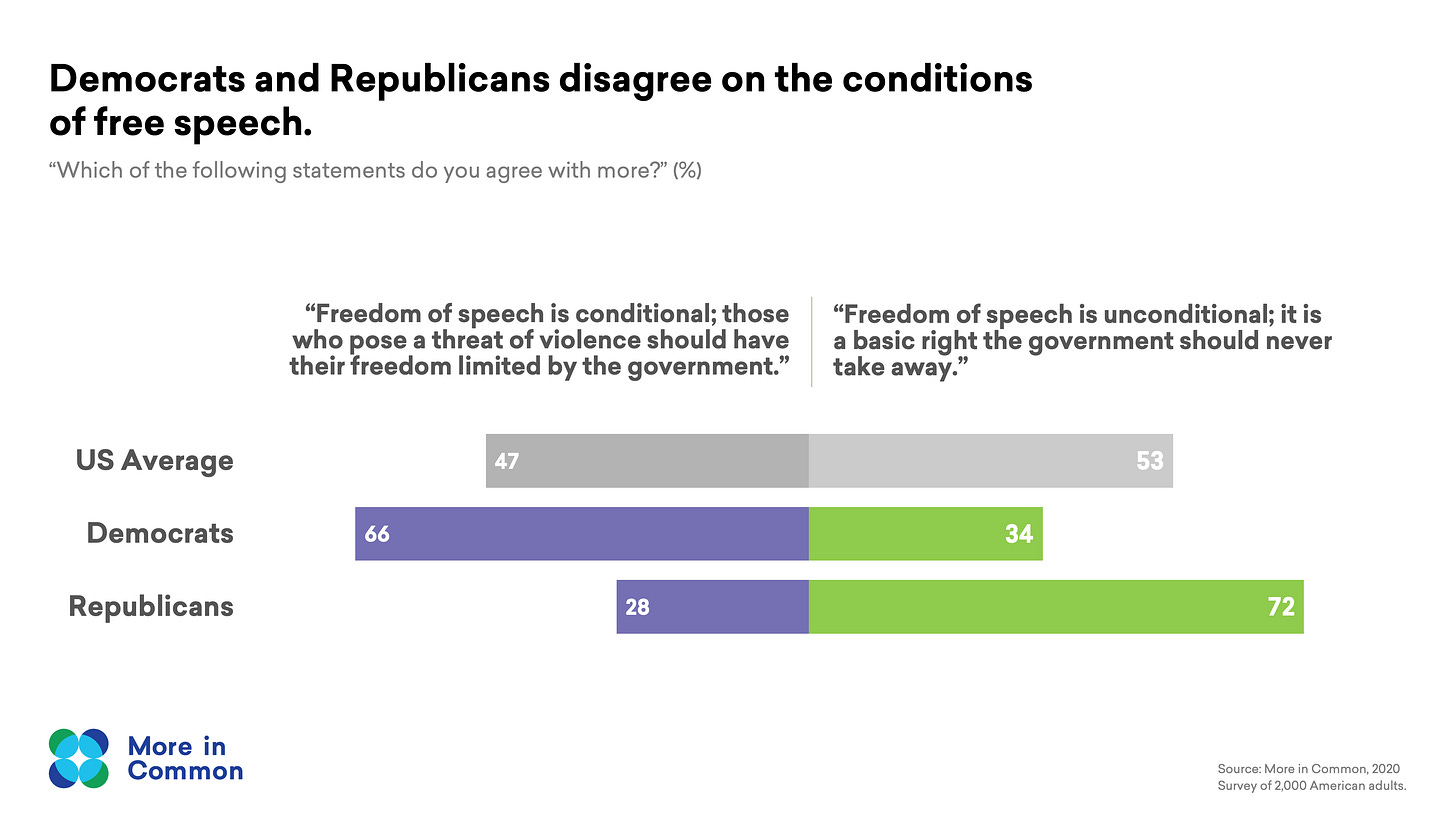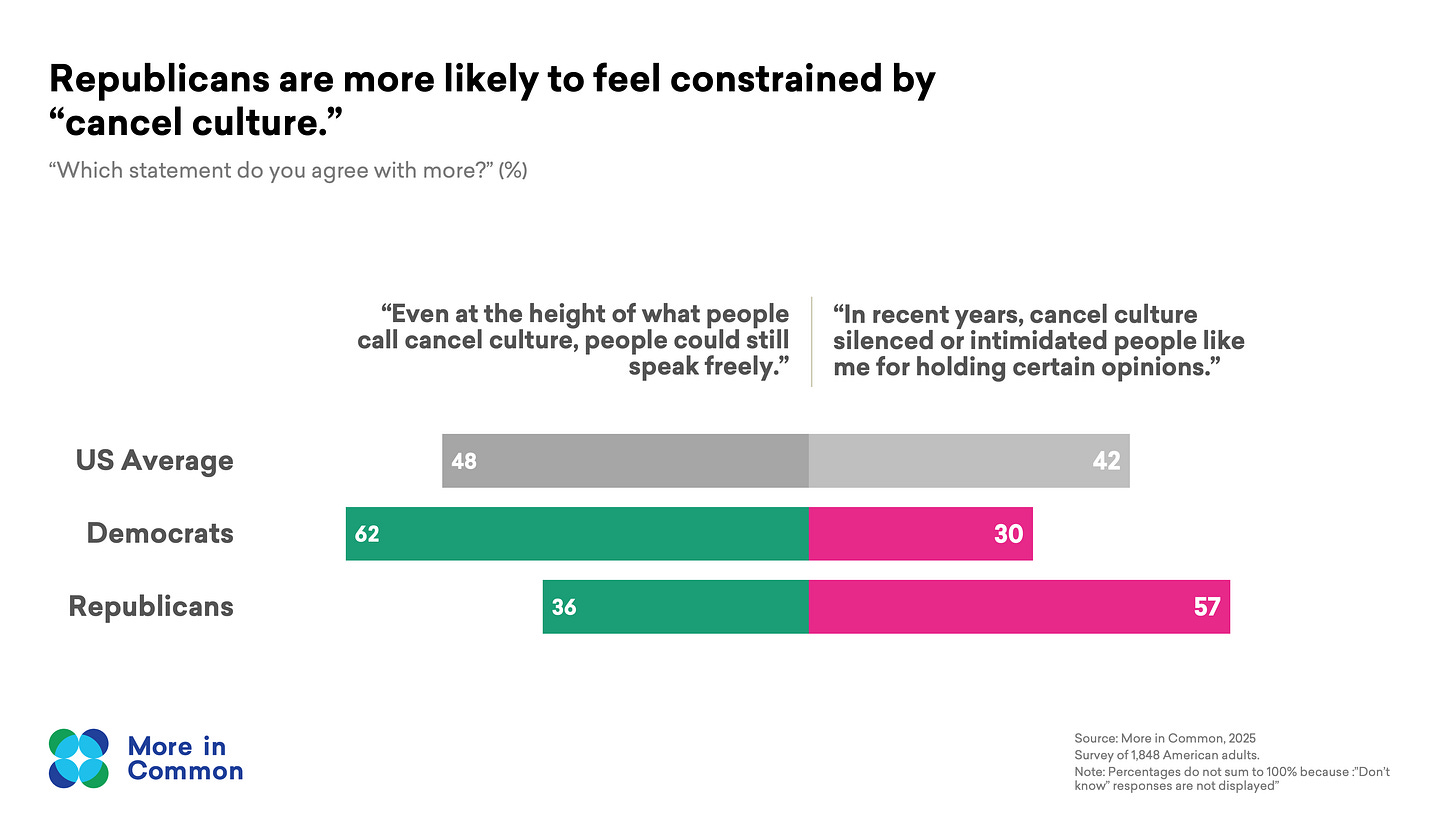How Americans View Free Speech
The killing of Charlie Kirk, public reactions to the assassination, and reactions-to-reactions have reignited longstanding debates about Americans’ right to freedom of expression. Incidents including Attorney General Pam Bondi’s recent comments on free speech, as well as Jimmy Kimmel’s suspension, reinstatement, and the role of the FCC in the ongoing battle, has only heightened the debate.
Over the last eight years, More in Common has regularly surveyed Americans’ attitudes on free speech. Following our recent summary of research on political violence, we have compiled our key insights on how Americans feel about free speech:
Americans consistently support and see free speech as core to American identity.
Americans underestimate the opposing party’s support for free speech.
Americans differ on how to balance free speech with considerations around safety and harm.
1. Free speech is core to American identity.
Since we first captured beliefs around free speech in our 2018 Hidden Tribes study, we’ve found large majorities of Americans across the political spectrum consistently support values of free speech. Our original work in 2018 (see page 129 of Hidden Tribes) found that roughly three in four Americans agree that “people should be able to say what they really think, even if it offends other people.”
Six years later, our 2024 Promising Revelations study found that over 90 percent of Americans across political affiliations believe that freedom of speech is an essential part of being American. Notably, freedom of speech ranks far higher than other characteristics of being American, such as where one is born, or having a particular faith tradition or race.
In 2025, we asked our online panel of Americans to list rights Americans have in this country. We found that freedom of speech was by far the most common reference.
2. Americans underestimate the opposing party’s support for free speech.
Despite widespread support for this unalienable right, Americans do not fully recognize the opposing party’s support. When we asked Americans this summer whether “freedom of speech” is unconditional, strong majorities of Republicans and Democrats agree. Yet they vastly underestimate the other party’s agreement: Republicans think only 52% of Democrats agree, and Democrats think only 57% of Republicans agree.
3. Americans differ on how to balance free speech with considerations around safety and harm
Debates continue over the trade-offs required to protect free speech while preventing harm. When the day-to-day of politics confronts Americans’ universal support for the principle of free speech, views fall more along partisan lines.
Over the last five years, Democrats have placed greater emphasis on setting limits. In a 2020 study, we found that 66% of Democrats agreed that “Freedom of speech is conditional; those who pose a threat of violence should have their freedom limited by the government,” while 67% of Republicans agreed instead that “Freedom of speech is unconditional; it is a basic right the government should never take away.”
Republicans are also more likely to feel personally constrained by “cancel culture.” In a 2025 poll, we find that 57% of Republicans say “cancel culture silenced or intimidated people like me for holding certain opinions,” compared with 62% of Democrats who agree that “Even at the height of what people call cancel culture, people could still speak freely.”
Similar patterns appear on college campuses. Our 2023 study with the Constructive Dialogue Institute found that very liberal students were five times more likely than conservative students to have engaged in “calling out, punishing, or canceling” behavior—or to endorse social censure as a consequence.
Conclusion
In yesterday’s New York Times, FIRE’s Greg Lukianoff offered a substantive defense for the principle of free speech. He warned: “The weapon that you reach for today will be used against you tomorrow. Using your opponents’ nastiest tools doesn’t persuade them to disarm; it inspires retaliation. Tit for tat, forever and ever.”
Such a tit for tat is where we’re headed, with Republicans not only responding in kind but by raising the stakes. If the Left used its cultural influence and institutions to police ideas and cancel dissenters, the Right is threatening to do so today not with online mobs or university administrators, but with the weight of the administration.
Because of entrenched partisanship and toxic polarization, it’s unlikely that administration officials will be dissuaded from their current free speech brinksmanship by even the most-sound or best-faith arguments if they’re put forth by Democrats, nor even by the most principled nonpartisans.
The administration is much more likely to be persuaded by their co-partisans; and indeed, a diverse range of conservative voices from Tucker Carlson to Ted Cruz to the National Review to Megyn Kelly have raised the alarm on what they are calling an overreach of government authority. At the very least these and other conservative elites seem to have forced the Attorney General to walk back her remarks about prosecuting hate speech.
We now face a choice: call out your own side, or watch as we race to the bottom in retaliatory efforts at censorship.
We can’t do this without you!
MIC regularly conducts research that sheds light on both cross-group misperceptions and common ground. Consider supporting our work by making a donation.


